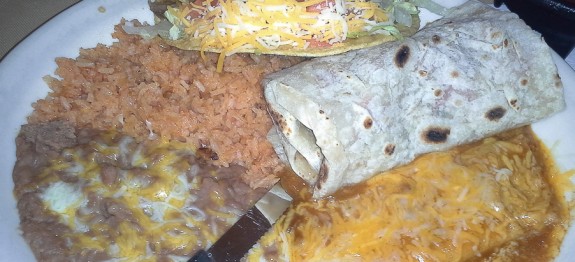15 Dieting Tips When Dining Out
Whether you dine out for pleasure, a special occasion, travel, or due to necessity you can eat healthy breakfasts, lunches, and dinners and prevent weight gain.
Many restaurants do not make it easy. Large portion sizes, like the meal pictured, are the norm making it easy to eat more calories than your body needs. Add an alcoholic beverage and dessert and you can easily have a 2,000 calorie meal. You can’t lose weight or prevent weight gain by eating multiple 2,000 calorie meals per day.
Understanding what foods are calorie dense is helpful. These calories come from foods high in fa and sugar, and alcoholic beverages. A 750 ml bottle of red wine has about 640 calories. If you eat three meals per day. Each meal should average between 650 and 900 calories. Drinking 320 calories by splitting a bottle of wine isn’t the best source of calories. Aside from some medical benefits wine, like sugar is empty calories. Beer and liquor including mixed drinks are included. Have you ever heard of anyone having a vege belly?
High calorie dense foods include:
- Fried foods
- Beef
- Pork
- Cream sauces
- Butter sauces
- Salad dressings
- Desserts and Sweets
- Specialty coffees
- Any food high in fat, refined flour, and refined sugar
Tips for Breakfast and Lunch
Tip 1.
Eat a balanced breakfast of complex carbohydrates (fruits and vegetables), high quality protein (eggs), and polyunsaturated fat.
Tip 2.
Eat low calorie eggs instead of pancakes, toast, bagels, and waffles.
Tip 3.
Eat low calorie eggs instead of pancakes, toast, bagels, and waffles.
Tip 4.
Drink coffee black, limit added sugar, and use milk instead of cream.
Tip 5.
Drink regular coffee black or with 1 to 2 teaspoons of added sugar. Avoid high calorie specialty coffees loaded with sugar and fat.
Tip 6.
Drink water instead of fruit juices or soft drinks even diet soft drinks.
Tip 7.
Eat a balanced lunch including fruit and vegetables. Limit or avoid starchy vegetables like potatoes.
Tip 8.
Limit low nutrition foods like desserts, potato chips, candy bars and soft drinks
Tip 9.
Eat an ounce of nuts or a piece of fruit for dessert instead of ice cream, cakes, and pieces. Most restaurant breakfast provide plenty of calories with added a slice of cake or pie.
Tips for Dinner
Tip 1.
Avoid calorie dense, low nutrition foods like fried appetizers, desserts, potato chips, cream sauces, and sugary soft drinks.
Tip 2.
Share or skip the appetizer. One appetizer can have up to 1,000 calories. Avoid fried appetizers and dips like cheese or artichoke. They are high in calories and sodium.
Tip 3.
Limit alcohol consumption to zero or 1 drink. Buy a bottle of wine when it will be shared by 4 or 5 diners.
Tip 4.
Share an entrée or dessert. But beware, that many super sized desserts can have 1,000 or more calories.
Tip 5.
The later you eat dinner the less you should eat. Unless you plan to stay up until 2:00 am, doing to bed on a full stomach can cause a restless night. It takes 4 to 5 hours for your stomach to empty its contents.
Tip 6.
Limit or avoid fried foods like chicken, fish, potatoes, and chicken fried steak drowned in white sauce. They easily add up to 1,000 to 2,000 calorie meal.
Tip 7.
When portions are huge, eat half of what’s served and take the rest home for lunch or dinner the next day. You get two meals for the price of one, prevent food waste, and save money.
Tip 8.
Skip dessert or order it to go and have it for a continental breakfast the following day. Your calorie counter reset to zero each morning.


